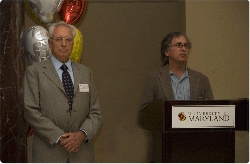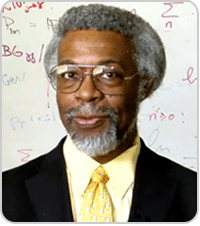High-temperature superconductivity reveals its secret
- Details
- Published: Friday, August 05 2011 09:46
High-temperature superconductivity, the ability of certain materials to conduct electricity with zero electrical resistance at temperatures above the boiling point of liquid nitrogen, was unexpectedly discovered in copper oxide (cuprate) materials in 1987. High-temperature superconductivity could revolutionize technologies ranging from magnetically-levitated trains to electrical power transmission. However, the mechanism by which these cuprate materials become superconducting has remained a mystery for almost 25 years. Now, scientists at the University of Maryland, College Park, have found the strongest evidence yet that the cause of high-temperature superconductivity involves the pairing of electrons by magnetic excitations (spin fluctuations). The new experimental results suggest ways to improve the superconductivity in these novel materials, with the ultimate goal of finding superconductors that operate at room temperature. The Maryland research was led by Professors Richard L. Greene and Johnpierre Paglione of the Maryland Center for Nanophysics and Advanced Materials (CNAM), a sub-unit of the Department of Physics. Also making very important contributions to this research were postdoctoral scientists Drs. Kui Jin and Nicholas P. Butch and graduate student Kevin Kirshenbaum. Their findings appeared in the August 4 issue of Nature (476, 73 (2011)).
Superconductors are materials that conduct electricity with 100 percent efficiency, losing nothing to resistance. They were discovered exactly 100 years ago by the Dutch physicist Heike Kamerlingh Onnes, just after he developed a method to liquefy Helium gas at ~4 degrees above the absolute zero of temperature (i.e., at 4 Kelvin, which is equivalent to – 269 Celsius). Currently used in medical imaging (MRI), highly efficient electrical generators and high field magnets, superconductors have the potential to become a truly transformative technology; energy transmission would be just one beneficiary. However, this promise is hampered by one thing: superconductors work only at extremely low temperatures. Although research over the past 25 years has developed “high‐temperature superconductors” that work at warmer temperatures, even the warmest of them—the cuprates—must be chilled half‐way to the absolute zero of temperature (0 Kelvin) before they will superconduct.
The prospect of being able to dramatically increase that working temperature, thus making superconductors easier and cheaper to use, has kept a significant scientific interest in the cuprates. But to change something you have to understand it, and the cause of the cuprate superconductivity has remained a mystery. The mechanism behind “low-temperature” superconductivity has been known since 1958 when the BCS theory, named after its Nobel Prize discoverers, John Bardeen, Leon Cooper and Robert Schrieffer, was developed. This theory showed that in the superconducting state the conducting electrons of the material are bound together in “Cooper pairs”, a lower energy state that permits electrical conduction with no resistance. The binding of the Cooper pairs is caused by a coupling between the electrons and the thermal vibrations of the atoms themselves, a complex many-body quantum effect called the electron-phonon interaction. But, the electron-phonon mechanism cannot explain the Cooper pairing found in the high-temperature superconducting (high-Tc) cuprates. So what is the pairing “glue”, or is there even a pairing “glue”, in high-Tc superconductors?
Many ideas have been suggested for how high-temperature superconductors work. Among these theories are those that propose an electron coupling to the magnetic excitations of the material (spin-fluctuations), rather than phonons, as the pairing “glue” in cuprates. The copper atoms in the cuprates have electrons with a quantum mechanical property call “spin”. One can think of an electron with spin as a tiny bar magnet, with a north and a south pole. In cuprates the spins can arrange themselves such that the spin on each adjacent copper atom is pointing in the opposite direction, i.e. alternating north and south poles. This is called an antiferromagnetic state of matter, and at temperatures above absolute zero such a state is subject to thermal fluctuations of the atomic spin direction. It is then theoretically possible for the conduction electrons to couple to these fluctuating spins and form Cooper pairs, somewhat in analogy to how Cooper pairs are formed by the coupling between phonons and electrons.
But, until the work done at Maryland, there had been no direct experimental evidence of a link between the spin fluctuations and the superconductivity. By measurements on a series of thin film cuprate samples with different superconducting transition temperatures (Tc), the Maryland researchers showed a direct correlation between an anomalous linear-in-temperature variation of the electrical resistance in the non-superconducting, or normal, state and the superconducting Tc. The linear-in-temperature resistance was shown to arise from scattering of the electrons from the spin fluctuations. Experiments by others had previously shown that spin fluctuations are present in all samples that are superconducting. Therefore, the Maryland work convincingly shows that an electron-spin fluctuation interaction is the cause of high-Tc superconductivity. This experimental result, in conjunction with some other recent experimental work, rules out many of the theories that had been proposed for high-Tc superconductivity.
Now that the basic mechanism of high-temperature superconductivity is understood, theorists can focus their attentions in understanding why some materials have much higher Tc’s than others, and how to design new materials with even higher Tc’s. Ultimately the research may lead to new materials that superconduct at room temperature, enabling new transformative applications.


